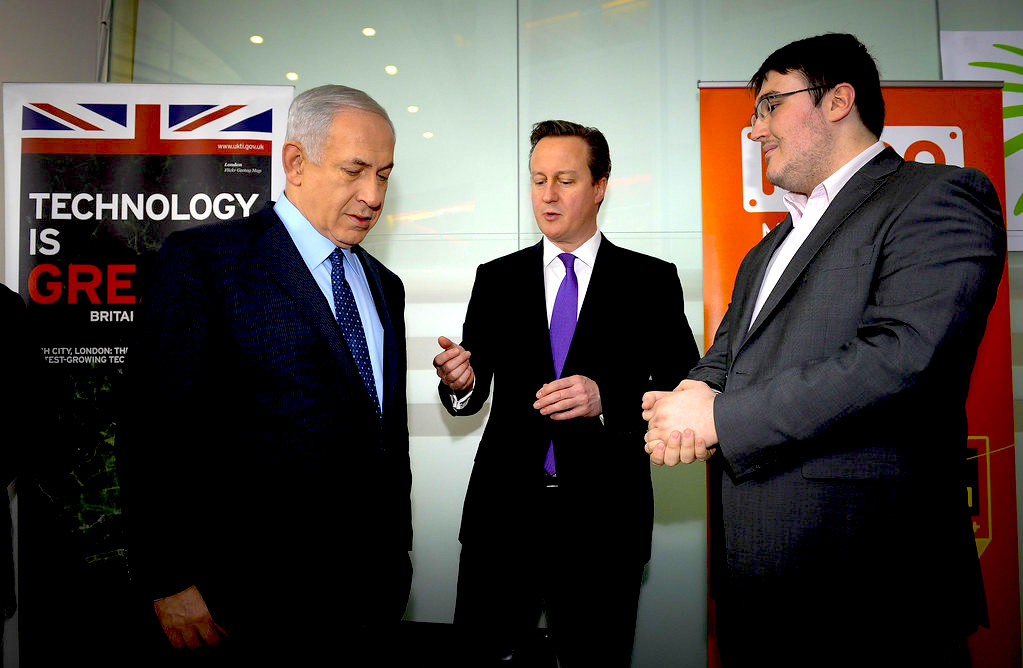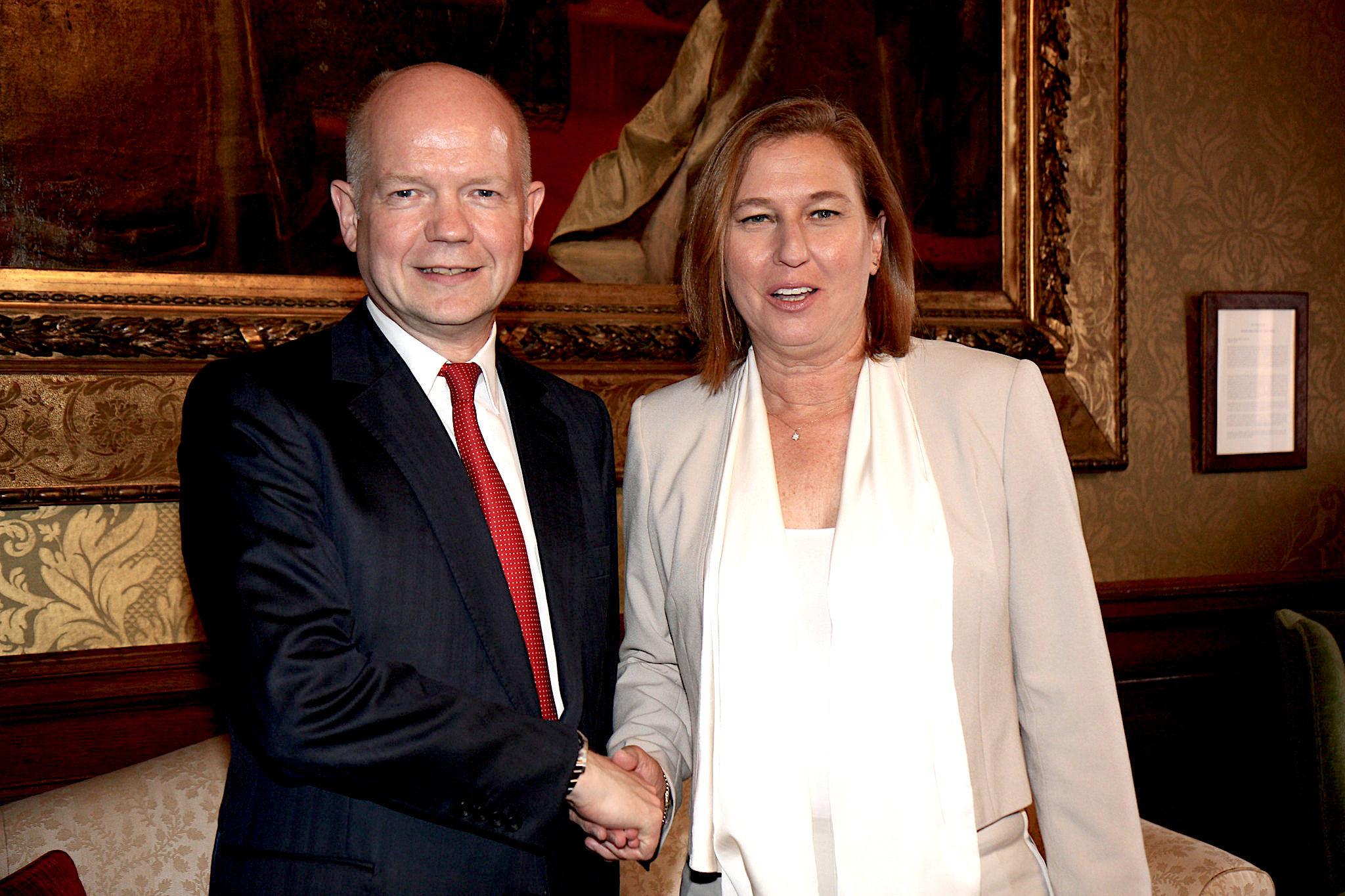The Israeli government waged a decade-long campaign to protect its officials from criminal proceedings in Britain, leaked files show, John McEvoy reports.

Brigadier General Doron Almog at the Gaza Division commander exchange ceremony in November 1993. (IDF Spokesperson’s Unit, Wikimedia Commons, CC BY-SA 3.0)
By John McEvoy
Declassified UK
- Revelation comes as the International Criminal Court considers arrest warrants for Israel’s Prime Minister Benjamin Netanyahu.
 When retired Israeli General Doron Almog boarded his flight from Tel Aviv on Sept. 11, 2005, he expected to soon step foot on British soil.
When retired Israeli General Doron Almog boarded his flight from Tel Aviv on Sept. 11, 2005, he expected to soon step foot on British soil.
Minutes after landing at Heathrow airport, however, an Israeli embassy official boarded the plane and warned Almog to stay onboard.
An arrest warrant had been issued for the former army chief over alleged war crimes committed in Gaza, and British police officers were waiting at the immigration desk to seize him.
Almog remained on the plane for two hours before departing again for Israel. U.K. counter-terrorism police had decided not to board the jet, fearing an attempt to do so might lead to a firefight on the tarmac at Heathrow.
The incident seemingly marked the first time that an arrest warrant had been issued in Britain for an Israeli national over abuses against Palestinians, and it sent shockwaves through the Knesset.
What followed was a decade-long campaign by the Israeli government to ensure that something like this could never happen again, leaked files reviewed by Declassified reveal.
The campaign focused on lobbying Britain to change its approach to universal jurisdiction legislation, which allows for the most serious crimes to be prosecuted in another country.
The goal was to allow Israeli officials to visit Britain without fear of arrest, particularly those accused of serious abuses against the Palestinians.
The emails and memos originate from a hack of the Israeli Ministry of Justice by a group called “Anonymous for Justice,” which describes itself as a “hacktivist collective.”
Israeli authorities acknowledged in April that a “cyber incident” took place and said it was “under review.” They did not respond to a request for comment.
Huda Ammori, the co-founder of Palestine Action, told Declassified: “It’s despicable and an affront to our democracy that the Israeli government has the ability to lobby our government to change the laws in their favour, to stop them from being prosecuted for war crimes.”
Ammori’s group aims to shut down Israeli arms factories in the U.K. She said the Crown Prosecution Service (CPS) is “now persecuting people from Palestine Action for trying to stop war crimes being committed by the Israeli state.”
She added: “Our system in this country works to favour suspected war criminals over the rights of its own citizens trying to stop those war crimes from happening.”
Changing the Law

Israeli Ministry of Justice building in Jerusalem. (Zion Halevi, Wikimedia Commons, CC BY 4.0)
Following General Almog’s narrow escape in 2005, the Israeli government privately lobbied Britain to water down its approach to universal jurisdiction.
Universal jurisdiction allows for the most serious crimes such as genocide and torture to be prosecuted in another country. Its present-day application was developed during the Nuremberg trials, when criminal proceedings were held against high-ranking Nazi officers.
One Israeli memo addressed to Britain’s Ministry of Justice, for instance, outlined concerns about the “misuse of existing criminal procedures in the UK in universal jurisdiction cases, as it affects Israeli nationals.”
The memo urged that “serious consideration be given to addressing these concerns, in the immediate term, through specific legislative amendments.”
Israel’s proposed amendments included requiring “the consent of the Attorney-General or the DPP [Director of Public Prosecutions] before an arrest warrant or summons is issued.”
The U.K. government was also pressed to outline what considerations would be taken into account by the attorney general or the DPP before such consent would be offered.
Israel’s recommendations were apparently well received.
In September 2011, David Cameron’s coalition government passed new legislation requiring the consent of the DPP before universal jurisdiction arrest warrants could be issued — precisely what Israel had requested.

March 13, 2014: Cameron, center, with Netanyahu, on left, during a visit to Israel and the Palestinian territories. (Number 10, Flickr, CC BY-NC-ND 2.0)
Britain’s then Foreign Secretary William Hague indicated how the changes were being implemented with Israeli officials in mind. “We cannot have a position where Israeli politicians feel they cannot visit this country,” he declared.
Still Not Satisfied
Despite the changes, the Israeli government was still not convinced its officials (both serving or retired) were completely safe from arrest in Britain.
In October 2011, Israel’s former Foreign Minister Tzipi Livni visited Britain and was faced with an arrest application over alleged war crimes committed during Operation Cast Lead, Israel’s brutal bombing campaign of Gaza in 2008-9.
In line with the new legislation, the application was sent to the DPP, Keir Starmer, who according to one Israeli document was “actively considering granting his consent” to the arrest.
Starmer nonetheless deliberated on the evidence for long enough that the Foreign Office was able to attribute “special mission status” to Livni’s visit, granting her temporary diplomatic immunity.
Precisely why Starmer failed to reach a decision in time remains unclear. The CPS is refusing to release information to Declassified about what happened.

Hague meeting with Livni in London, May 2014. (Foreign, Commonwealth & Development Office, Flickr, CC BY 2.0)
walked free. But the incident convinced the Israeli government that Britain’s new safeguards were insufficient to protect its officials from arrest.
As a result, the Israeli Ministry of Justice continued to lobby Britain over its approach to universal jurisdiction cases.
In June 2013, Israel’s attorney general held “detailed and expansive discussions” with Starmer on the issue.
A follow-up meeting was attended by CPS International Director Patrick Stevens and Marlene Mazel from Israel’s Department of Special International Affairs.
The CPS declined to comment when approached by Declassified, but did not dispute that these meetings had taken place.
UK-Israel Dialogue
The high-level discussions continued into 2016 with the establishing of a “UK-Israel dialogue on Universal Jurisdiction,” the leaked files show.
The dialogue opened in November of that year, with Israeli Foreign Minister Tal Becker and Justice Minister Roy Schondorf meeting with the then DPP Alison Saunders and several other British officials in London.
It was clearly a secretive affair. “Make sure the meeting is not subject to the FOI [Freedom of Information] act,” instructed one Israeli note.
During the meeting, the Israeli delegation emphasised once again how officials “would like to visit the U.K. for a variety of reasons,” but “the status quo complicates their ability to do so.”
It was also noted how the issue had “taken a harsh tone that is surprising between close friendly nations,” with the Israeli government constantly applying for “special mission” certificates and taking up “a substantial amount of senior U.K. officials’ time.”
To this end, further modifications to British legislation were encouraged such as drafting a U.K.-Israel agreement on concurrent jurisdiction and replacing DPP consent with that of the attorney general.
It was also agreed “that a high level U.K. official will publish a public statement regarding the independence, fairness and impartiality of the Israeli legal system,” according to one Israeli file.
Yet once again, this was not enough for the Israeli government.
Over the following weeks, Israeli officials continued to push the U.K. government to make further changes, grumbling about how “unnecessary and unmeritorious processes” could be initiated against “members of the Israeli government [… and] military.”
In a confidential dispatch, Britain’s Ministry of Justice tried to reassure the Israelis that “since the introduction of a requirement for the DPP to approve applications for private arrest warrants, no such arrest warrants have [been] issued for anyone, including Israeli visitors.”
Despite this, the issue apparently remains unresolved.
Since 2016, the Israeli government has continued to apply for “special mission” certificates for visiting Israeli officials, including Livni and the former Defence Minister Shaul Mofaz.
The U.K. government has also provided these certificates amid the ongoing genocide in Gaza, with Israeli war minister Benny Gantz receiving diplomatic immunity to visit Britain in March 2024 for meetings with then foreign secretary David Cameron.
Britain’s Justice Ministry and Foreign Office were approached for comment.
John McEvoy is an independent journalist who has written for International History Review, The Canary, Tribune Magazine, Jacobin and Brasil Wire.
This article is from Declassified UK.
Views expressed in this article may or may not reflect those of Consortium News.
Please Donate Today to CN’s Fall Fund Drive



The bloody brits are complicit in anything morally offensive regarding israel:
Xxxx://www.theguardian.com/world/2023/aug/24/uk-seeking-block-icj-ruling-israeli-occupation-palestine
And here’s part one of a four part series from Aljazeera on a six month undercover investigation into the israeli lobbying in the UK:
Xxxx://www.aljazeera.com/program/investigations/2017/1/10/the-lobby-young-friends-of-israel-part-1